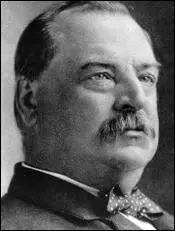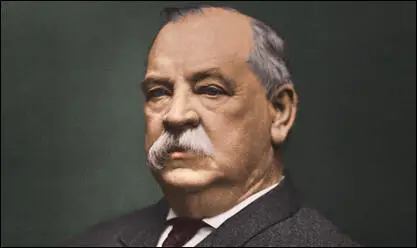Grover Cleveland

Stephen Grover Cleveland, the son of a Presbyterian minister, was born in Caldwell, New Jersey, on 18th March, 1837. After the death of his father he had to support his widowed mother and decided not to go to college. He worked for a law firm in Buffalo and after becoming a member of the Democratic Party, was elected mayor of the town.
Cleveland's reputation for being an honest politician helped him become governor of New York in 1882. Two years later Cleveland was selected as the Democratic Party presidential candidate. In the election Cleveland was helped by the strong showing of John St. John, the candidate of the Prohibition Party. His votes were mainly taken from James Blaine of the Republican Party. Cleveland won and became the first Democrat to be elected president since the Civil War.
Cleveland was a reforming president and attempted to deal with patronage by transferring jobs to the civil service. However, attempts to reduce high protective tariffs was blocked by the Republican controlled Senate.
The tariff issue dominated the 1888 presidential election and contributed to him being defeated by the Republican candidate, Benjamin Harrison. Cleveland returned to his law practice in New York until being nominated to be the Democratic candidate in the 1892 presidential election. This time Cleveland defeated Harrison and he became president for a second time.

Cleveland was concerned with the drain of gold from the Treasury. In 1894 and 1895 he issued bonds to obtain gold, selling them to a banking syndicate headed by J. P. Morgan. This was unpopular with the rural community and he also lost support from the emerging labour movement, when he sent troops to deal with a railroad strike in Chicago.
In foreign policy Cleveland was an isolationist. However, he implied that the United States would be willing to go to war during a dispute with Britain over the Venezuela-British Guiana boundary. Richard Olney, his secretary of state, managed to persuade the British government to accept arbitration and war was avoided. After Cleveland's retirement from politics in 1897, he became a lecturer at Princeton University.
Stephen Grover Cleveland died on 24th June, 1908.

